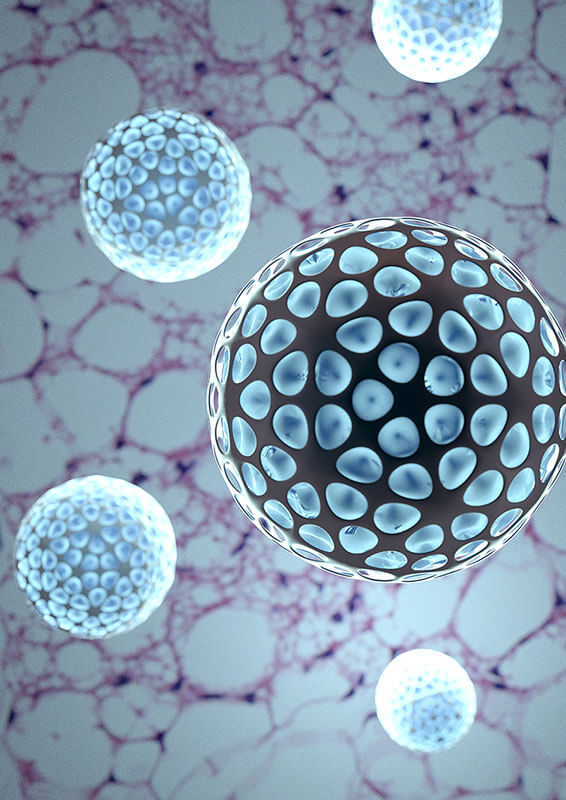September 13, 2018
Bad fat to good fat: Purdue-based startup developing technology aimed at helping treat obesity, diabetes
 Purdue University-based Adipo Therapeutics LLC received a Small Business Innovative Research grant to support technology aimed at converting bad fat to good fat. This image shows bioengineered nanoparticles inducing the conversion of bad fat. (Image provided by Alexander M. Gokan)
Download image
Purdue University-based Adipo Therapeutics LLC received a Small Business Innovative Research grant to support technology aimed at converting bad fat to good fat. This image shows bioengineered nanoparticles inducing the conversion of bad fat. (Image provided by Alexander M. Gokan)
Download image
WEST LAFAYETTE, Ind. – Imagine being able to turn bad fat into good fat inside your own body without exercising, but rather a simple injection.
That’s the goal of technology from a Purdue University-based startup, which has received a federal grant for its work to help people struggling with obesity and diabetes.
More than one-third of Americans are obese, and nearly 10 percent have diabetes, according to the Centers for Disease Control and Prevention.
Obesity is also a contributing factor to developing Type 2 diabetes. So, removing excess fat through nanoparticle injections would likely decrease the odds of developing that disease.
Adipo Therapeutics LLC received a Small Business Innovative Research grant of $198,323 from the National Institutes of Health to further develop and optimize its technology platform to help people with obesity and diabetes.
The technology aligns with Purdue's giant leaps celebration, acknowledging the university’s global advancements made in health, space, artificial intelligence and sustainability as part of Purdue’s 150th anniversary. Those are the four themes of the yearlong celebration’s Ideas Festival, designed to showcase Purdue as an intellectual center solving real-world issues.
“Obesity is driven by a systemic energy surplus in bad fat,” said Meng Deng, an assistant professor in Purdue’s Department of Agricultural and Biological Engineering, Weldon School of Biomedical Engineering, and School of Materials Engineering, who founded Adipo. “Built upon our interdisciplinary collaboration with Shihuan Kuang, professor of animal sciences, this funding is very helpful and will allow us to further develop our engineered polymeric nanoparticluate system to safely and effectively convert energy-storing bad fat to energy-burning good fat through regulation of Notch signaling pathway.”
SBIR supports small businesses in the United States by making research and development investments in technologies that have a strong potential for commercialization. A key objective is to translate promising technologies to the private sector and enable life-saving innovations to reach consumer markets.
Adipo Therapeutics integrates two platform technologies to develop polymer-based nanotherapeutics that act directly on fat tissue and maintain weight loss. A video about Adipo is available at https://youtu.be/9RK7nNbGwnU.
“Our technology holds great promise to offer unique value with targeted sustainable weight loss, improved glucose control, and minimized off-target side effects,” Deng said. “The support from Purdue Foundry and entrepreneurial ecosystem has been so incredible to help us get this far.”
Adipo is seeking funding to support further development and clinical translation. The company also seeks partnerships with firms and pharmaceutical companies interested in the technology. Deng can be reached via email at deng65@purdue.edu or by phone at 765-494-1190.
Technology used by Adipo has been licensed through the Purdue Office of Technology Commercialization.
About Adipo Therapeutics LLC
Adipo Therapeutics is developing a disruptive technology platform composed of polymer-based nanoparticulate drug delivery systems to induce adipocyte browning as a safe and effective therapeutic solution to treat obesity. This innovation combines the recent discovery of the role played by Notch signaling in adipocyte plasticity with advances in polymer-based drug delivery. This technology offers several unique value propositions including sustainable weight loss, improved glucose homeostasis and systemic metabolism, and minimized off-target side effects. Such an enabling technology platform can also be readily adapted to treat a broad spectrum of diseases such as fatty liver disease and atherosclerosis.
About Purdue Foundry
The Purdue Foundry is an entrepreneurship and commercialization accelerator in Discovery Park's Burton D. Morgan Center for Entrepreneurship whose professionals help Purdue innovators create startups. Managed by the Purdue Research Foundation, the Purdue Foundry was named a top recipient at the 2016 Innovation and Economic Prosperity Universities Designation and Awards Program by the Association of Public and Land-grant Universities for its work in entrepreneurship. For more information about funding and investment opportunities in startups based on a Purdue innovation, contact the Purdue Foundry at foundry@prf.org.
About Purdue Office of Technology Commercialization
The Purdue Office of Technology Commercialization operates one of the most comprehensive technology transfer programs among leading research universities in the U.S. Services provided by this office support the economic development initiatives of Purdue University and benefit the university's academic activities. The office is managed by the Purdue Research Foundation, which received the 2016 Innovation and Economic Prosperity Universities Award for Innovation from the Association of Public and Land-grant Universities. For more information about funding and investment opportunities in startups based on a Purdue innovation, contact the Purdue Foundry at foundry@prf.org. For more information on licensing a Purdue innovation, contact the Office of Technology Commercialization at otcip@prf.org. The Purdue Research Foundation is a private, nonprofit foundation created to advance the mission of Purdue University.
Writer: Chris Adam, 765-588-3341, cladam@prf.orgSources: Meng Deng, 765-494-1190, deng65@purdue.edu

